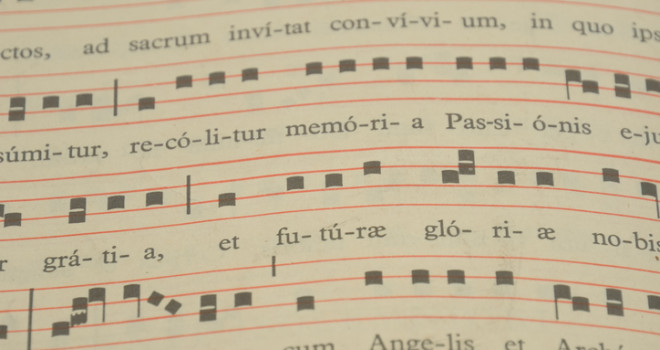7 Reasons for the Use of Latin in Mass
by Andy Milam
Much of what is written below comes directly from The Catechism Explained: An Exhaustive Explanation of the Catholic Religion by Rev. Francis Spirago.
7 Reasons for the Use of Latin in the Mass
- The Latin language is venerable on account of its origin and its antiquity; indeed, it dates back to the earliest centuries of the Church and to the very masses offered in the obscurity of the Catacombs.
- There is an element of mystery about Latin. It is a [static] language, not spoken by the faithful. The use of Latin conveys to the mind of the people that something is going on upon the altar which is beyond their comprehension; that a mystery is being enacted.
- Latin is a liturgical language for Catholics. It is a striking fact that both Jews and pagans made use, in their worship of the Deity, of a language with which the multitude were not conversant. The Jews in fact made use of Hebrew, the language of the patriarchs; we did not see Our Lord or the apostles censuring this practice.
- The use of Latin in the Mass is a means of maintaining unity in the Catholic Church, for the use of one and the same language in Latin Rite churches all over the world is a connecting link to Rome, as well as between nations separated by their cultures and native tongues.
- Latin is a safeguard against error because of its immutability. The near exclusive use of the vernacular inevitably leads to heresies and errors creeping into the Church. Likewise, the use of Latin helps to define and defend orthodoxy. As noted by Malcolm Cardinal Ranjith at Sacra Liturgia (2013):
“The liturgical use of Latin in the Church…gives rise to a series of expressions which are unique and which constitute the very faith of the Church. The vocabulary of the Credo is quite clearly filled with expressions in Latin which are untranslatable. The role of the lex orandi in determining the lex credendi of the Church is very much valid in the case of its use of Latin in the liturgy. For doctrine often evolves in the faith experience of prayer…”
- It is unnecessary for the faithful to hear, or understand, every ceremonial of the Mass. History has clearly shown, and experience teaches, that the fact of the prayers being in Latin does not at all hamper or interfere with the devotion of the faithful, or lead them to absent themselves from Holy Mass. As Saint Augustine instructed:
“If there are some present who do not understand what is being said or sung, they know at least that all is said and sung to the glory of God, and that is sufficient for them to join in it devoutly.”
- The primary reason why the whole of the Mass was historically offered in Latin is because it is a sacrifice, not an instruction for the people. The celebration of Mass consists more in action than in words. This final reason cannot be overstated. A Protestant gathering which commemorates the Lord’s Supper is simply a service of prayers and instruction. For this reason the vernacular is a necessity. The Catholic Mass, however, is a holy sacrifice offered to God the Father by an ordained priest, in persona Christi. The action of the Mass, and the mystery of it, is reinforced by the use of Latin.
In his 1962 apostolic constitution Veterum Sapientia, Pope St. John XXIII observed that:
“The Catholic Church has a dignity far surpassing that of every merely human society, for it was founded by Christ the Lord. It is altogether fitting, therefore, that the language it uses should be noble, majestic, and non-vernacular.”
May more priests and bishops in the coming years recognize that the use of Latin should not simply be limited to Masses offered in the Extraordinary Form. Indeed, both forms of the Roman Rite have every reason to be celebrated in a language that is “noble, majestic, and non-vernacular.”
Andy Milam is the Coordinator of Public Relations, Marketing, Fundraising and Tourism at the Shrine of the Grotto of the Redemption, an active member of the Knights of Columbus, and the Liturgical Coordinator for Una Voce Des Moines.

Leave a Reply